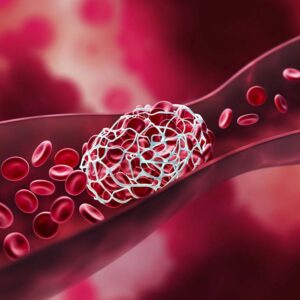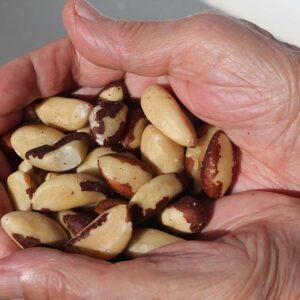
Spicy Condiment Kills Cancer
Dear Living Well Daily Reader,
Given the option, most of us would do anything to avoid chemotherapy.
And who could blame you? The sickening drugs and endless rounds of treatments can really wreck your body.
Even worse, they don’t always work — especially if you’re suffering from aggressive types of cancer.
Fortunately, German researchers have found that a common food might be the way to stop aggressive cancer in its tracks.
In fact, it could be the all-natural cancer alternative we’ve all been looking for.
This powerful cancer killer is hot peppers, just like the kind in your favorite hot sauce.
That’s right, your go-to condiment seems to have the power to kill cancer cells by the millions.
You see, capsaicin, the compound that makes hot peppers so spicy, can also help your body destroy cancer.
To prove this, researchers from Ruhr-University Bochum, in Germany, recently put capsaicin to the test against triple-negative breast cancer cells, which are particularly tough to beat.
In a lab, the scientists exposed these cells to capsaicin, and what they found was unbelievable…
The capsaicin not only slowed the growth of the cancer cells but also killed a large number of tumor cells.
Even better, it slowed down the few surviving cells, which could prevent the cancer from growing and spreading in the body.
Experts believe capsaicin is so effective against cancer because it activates a special pathway called TRPV1, which is present in many cancer cells.
Further research is needed to pinpoint an exact dosage for capsaicin use against cancer, but that doesn’t mean you shouldn’t start loading up on it now.
In fact, previous research has shown that it controls inflammation and can be a powerful pain reliever.
Be sure to add a hit of hot sauce to your favorite foods for added cancer protection.
If spicy foods don’t do it for you, you can also pick up a capsaicin supplement at the pharmacy or through online retailers like vitacost.com.
Live well,

Natalie Moore
Managing editor, Living Well Daily
Ed. Note: Please send your feedback: feedback@livingwelldaily.com – and click here to like us on Facebook.
Written By Natalie Moore
Natalie Moore is a dedicated health researcher with a passion for finding healthy, natural, and science-based solutions. After a decade of direct healthcare experience in western and natural medicine, she was involved in public health research before joining Living Well Daily.
View More Free Articles
Take the SHORTER Path to Dramatically Better Health
Are you tired of fitness gurus preaching the virtues of 5 AM workouts and pushing Olympic-level training regimens? Their narrative can feel exhausting and entirely unattainable. But before you toss in the towel completely, I’ve got news that might just put a spring back into your step. A groundbreaking new study reveals that the key...
Unexpected Perks of Your Coffee Habit Revealed!
We all know that the first cup of coffee in the morning can FEEL like a lifesaver. But what if it might actually BE saving your life? A groundbreaking new study suggests that your daily coffee habit could be protecting you from not just one but multiple chronic diseases. Let’s pour over this fascinating research…...
The TRUTH About Diabetes Drugs and Brain Aging
You’ve probably seen the gushing headlines… Most say something like, “Common diabetes drug protects the brain against aging!” And let’s face it, that sounds fantastic. After all, who doesn’t want to keep their brain young and in tip-top shape? The headlines refer to the results of a new study that suggests the widely prescribed type...
Hidden Smartphone Danger Puts You at Risk
Remember when we thought cell phones were just something for young folks to obsess over? Back when we were convinced they were nothing more than a passing fad? Well, times certainly have changed. Now, most people… including many of us older folks… have jumped on the smartphone bandwagon. Heck, some of us are practically as...
Preserve Your Mobility with “Agile Aging” Exercises
Aging has a way of humbling us. You lose hair where you want to keep it—and often end up growing it where you don’t. With every passing year, your eyesight fades, and your waistline expands. And as your once quick pace begins to slow, you fear developing the dreaded “senior shuffle.” But here’s the thing....
Yes, Lazy Saturday Lie-Ins Can BOOST Your Health
Are you burning the midnight oil during the week and catching up on sleep on weekends? Well, I’ve got some news that might help you feel less guilty about those lazy Saturday mornings. A new study suggests that weekend lie-ins might be doing far more than just helping you feel refreshed. Experts say they could...
Mailbag: 7 Hidden Culprits Behind Your Weight Gain
“Why am I gaining weight, even though I am watching what I am eating?” – Battling the Bulge Dear Battling, Gaining weight when you’re not trying to is frustrating. And it just gets worse as we age… often regardless of our diet. The truth is that various factors can promote weight gain even when you’re...
Popular Artificial Sweetener Linked to Dangerous Heart Risk
Remember when erythritol was the darling of the health food world? Well, this popular sugar substitute might not be as sweet a deal as we were led to believe… A shocking new study reveals a dark side to this widely used artificial sweetener. It turns out erythritol is associated with a dangerous—and even deadly—heart risk....
Cracking the Code on Chronic Inflammation
Inflammation and obesity are the evil tag team at the heart of nearly every major disease we face—from diabetes to obesity. What starts as a normal, healthy process to fend off dangerous invaders can quickly fan into the flames of chronic inflammation… and that includes in your gut. The trouble is almost no one has...
Dreaming of Better Sleep? Your Gut Holds the Key
Do you toss and turn at night? If so, you’re not alone. In fact, if you’re a senior over 65, you join nearly 17 percent of your peers who ALSO struggle with poor sleep quality. But science has uncovered a natural supplement that not only could help you catch more Z’s but can also give...









